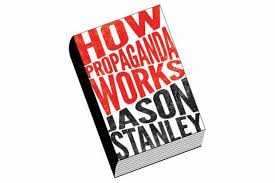


‘How Propaganda Works’ Is a Timely Reminder for a Post-Truth Age
Michiko Kakutani reviews ‘How Propaganda Works’:
n “Mein Kampf,” Hitler argued that effective propaganda appeals “to the feelings of the public rather than to their reasoning ability”; relies on “stereotyped formulas,” repeated over and over again, to drum ideas into the minds of the masses; and uses simple “love or hate, right or wrong” formulations to assail the enemy while making “intentionally biased and one-sided” arguments.
Although propaganda has usually been associated with totalitarian regimes like Nazi Germany and the Soviet Union, the scholar Jason Stanley, a professor of philosophy at Yale University, reminds us in his latest book that propaganda can also pose a grave danger to democracies. The subject couldn’t be more relevant, given the profusion of fake news and misinformation on the web today; a public with a voracious appetite for scandal and entertainment, coupled with media outlets obsessed with ratings and clicks; Russian meddling in the 2016 campaign and next year’s European elections; and a president-elect who has stoked the fears and grievances of supporters, and who frequently lies, flip-flops and sows confusion by tweet.
In this newly released paperback edition of “How Propaganda Works,” Mr. Stanley analyzes modern propaganda — its operation, techniques and fallout. His prose can eddy into annoying academic-ese, but the reader who can get past the repetitions and jargon will find that this book provides valuable insights into an important and timely subject.
Mr. Stanley begins by offering a definition of propaganda that extends beyond dictionary descriptions of biased or misleading information used to promote a particular political cause or point of view. “Propaganda is characteristically part of the mechanism,” he writes, “by which people become deceived about how best to realize their goals, and hence deceived from seeing what is in their own best interests.” This is achieved by various time-tested means — by appealing to the emotions in such a way that rational debate is sidelined or short-circuited; by promoting an insider/outsider dynamic that pollutes the broader conversation with negative stereotypes of out-of-favor groups; and by eroding community standards of “reasonableness” that depend on “norms of mutual respect and mutual accountability.”
For the rest of this piece, click here.